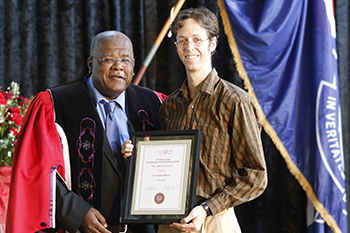Latest News Archive
Please select Category, Year, and then Month to display items
12 October 2020
|
Story Arina Engelbrecht
|
Photo Supplied
 Arina Engelbrecht from Organisational Development and Employee Well-being believes physical activity has a number of benefits for one’s health, including stress relief.
Arina Engelbrecht from Organisational Development and Employee Well-being believes physical activity has a number of benefits for one’s health, including stress relief.
Being physically active plays a big role in preventing the development of mental-health problems and in improving the quality of life of people experiencing mental-health problems.
Treatment for depression
Physical activity can be an alternative treatment for depression. It can be used as a stand-alone treatment or in combination with medication and/or psychological therapy. It promotes all kinds of changes in the brain, including neural growth, reduced inflammation, and new activity patterns are formed that promote feelings of calm and well-being. It releases endorphins – powerful chemicals in the brain that energise your spirit and make you feel good.
Physical activity can be very effective in relieving stress. Research in adults has found that physically active individuals tend to have lower stress levels compared to individuals who are less active. It also leads to improved sleep. When a person sleeps better and feels more rested, overall quality of life improves. They cope better with daily life stressors.
Reduce Alzheimer's risk
Regular physical activity can reduce your risk of developing Alzheimer's disease by up to 50%. It can also slow down further deterioration in those who have already started to develop cognitive problems. It stimulates the brain’s ability to maintain old connections as well as to make new ones.
A study asked people to rate their mood immediately after periods of physical activity (e.g. going for a walk/run, cycling, doing housework) and periods of inactivity (e.g. reading a book or watching television). Researchers found that participants felt more content, more awake, and calmer after being physically active compared to after periods of inactivity.
In conclusion, people who are physically active feel a sense of well-being, feel more energetic throughout the day, sleep better at night, have sharper memories, and feel more relaxed and positive about themselves and their lives.
“Being physically active not only changes your body, it changes your mind,
attitude, and your mood.” – Arina Engelbrecht
Book Prize for Distinguished Scholarship awarded to Dr Christian Williams
2016-03-24

Prof Jonathan Jansen, Vice-Chancellor and Rector of the University of the Free State and Dr Christian Williams, senior lecturer at the UFS Department of Anthropology.
Photo: Johan Roux |
When Dr Christian Williams moved from the United States to Namibia in January 2000 as part of the WorldTeach volunteer programme for teachers, he had not anticipated an award-winning piece of scholarship in his future. It was during these visits to Namibia, though, that the seeds for his highly-acclaimed book were sewn.
While volunteering at the St. Therese Secondary School in Tses at that time, Dr Williams – now a senior lecturer at the University of the Free State (UFS) Department of Anthropology – became acquainted with some of the school’s alumni. The stories these individuals started sharing with him soon revealed personal histories of exile and violence by fellow SWAPO (South West Africa People’s Organization) members.
These experiences ultimately resulted in Dr Williams’ book, National liberation in postcolonial southern Africa: a historical ethnography of SWAPO’s exile camps, published last year. Due to the book’s literary impact, the university awarded Dr Williams the UFS Book Prize for Distinguished Scholarship on Friday 19 February 2016. Dr Williams is the second academic to be awarded this prize.
Politics of the past
In the 1960s, Namibians mobilised and retaliated against colonial rule under the liberation movement known as SWAPO. This created political tension which resulted in the flight of many SWAPO members to exile camps administered by the party.
“Over its three decades in exile, SWAPO was responsible for the welfare of roughly 60 000 Namibians. This was about 4% of the total Namibian population at independence – most of whom lived in camps,” says Dr Williams. The research originally used as a basis for his doctoral thesis was subsequently developed into this prize-winning book.
Advancing the Human Project
“It’s an honour to receive recognition from the university; it means that they value the kind of work that I am doing. I think it’s great for universities to have such prizes,” Dr Williams says.
Supporting the UFS Human Project, Dr Williams will donate a portion of the R25 000 prize money towards the UFS Student Bursary Fund Campaign, as well as the school in Namibia.The rest will subsidise the purchase of the book for distribution to libraries and as gifts.